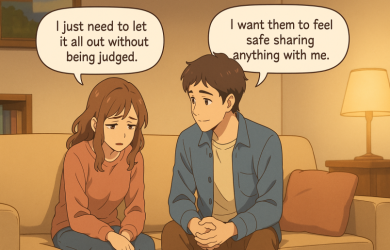5 Ways to Turn Conflicts Into Intimacy

Unlock Daily 30-Sec Tips for a Happier Relationship
👉 Subscribe FREEKey Takeaways
Marriage.com AI Quick Summary
All relationships will have some element of conflict at various times. But the couples who know how to use conflict to move towards a more intimate and close bond with each other know that they shouldn’t avoid conflict.
Instead, they view differing opinions as a way to better understand their partner’s point of view. And when you better understand your partner, you naturally increase the level of closeness and intimacy in your relationship.
Let’s look at some ways you can look at a friction-filled issue that is happening in your relationship and use that moment to build more closeness and understanding between you and your partner.
What is conflict intimacy?
In the current world, there seems to be a growing trend of people seeking out and engaging in more conflict. It is often seen as a way to build stronger relationships or even just be more engaged in life.
Conflict intimacy in a marriage can be defined as a relationship in which both partners are comfortable expressing their negative feelings openly and honestly with each other while maintaining an open and caring relationship. Conflict intimacy is essential for a couple wanting to have healthy and fulfilling romantic relationships.
What causes relationship conflict?
Often it is said that the cause of relationship conflict is due to one of the partners being selfish or self-centered. However, this is usually not the case. While selfishness may contribute to certain conflicts in a relationship, it usually does not pose the main issue.
More often than not, relationship conflicts occur as a result of one partner feeling neglected or misunderstood by the other. This can lead to feelings of insecurity and frustration in one or both partners.
Recognize that conflict in romantic relationships is inevitable
It does not spell “doom” for the relationship. It is part of life and part of sharing a life with someone else.
Try the soft approach to conflict. Try to work on it before it escalates into more than it is. You and your spouse have a number of hot-ticket items, things that can quickly escalate into true fights.
They could be tangible tasks, like him forgetting to take the trash out to the curb on pickup day. Or they could be personality quirks, like his constant humming or always checking his phone while you are trying to have a conversation with him.
You can use preemptive action to ward off a large fight while at the same time increasing your communication skills within the couple.
That’s a win-win, right? Here’s how you do it.
6 simple steps through conflict to intimacy
Check out the simple steps to turn conflict into intimacy:
1. Identify the recurrent issues
These could be finances, in-laws, child-rearing, how you spend weekends, sex, alcohol or other substance abuse, lack of acknowledgment.
Related Reading: 20 Tips to Deal With Unresolved Issues in a Relationship
2. Rank them according to the seriousness
Which ones send your blood pressure soaring, and which ones could you brush off if need be?
3. Break down how you react to these issues
How to deal with conflict in a relationship? Do you just roll your eyes, or do you jump right in and start the fight with name-calling and dredging up past ills?
In other words, do you do zero to ten in 2 seconds, or are you more of a slow burn?
Now, let’s look at your behavior when conflict presents itself. To reap the benefits of fighting constructively, it’s best to have a plan in place before fights occur.
Here are some ideas to help you make a general plan of “attack” for turning conflict into an opportunity for intimacy.
4. Identify what the exact issue is
You will not be able to work through things if you aren’t clear on the nature of the problem.
Whose issue is it? Yours? Their’s? Shared? Usually, one person in the relationship is more attached to the issue than the other.
Is this a single-issue conflict or a multi-issue one?
Gain clarity on what is at stake and if perhaps one thing is masking another.
What is your main concern about this issue? How would you like to see this issue resolved? What is your spouse’s main concern? How would he like to see this issue resolved? How important is it in the grand scheme of the relationship?
Is it something that has an impact on the entire family, like a substance addiction, or is it just pesky forgetfulness, like forgetting to transfer the laundry from the washer to the dryer?
5. Ask yourself if the issue can be resolved
According to relationship expert Doctor John Gottman, 69% of problems in a relationship are unsolvable.
But don’t let that figure depress you.
Some issues can be resolved with a good discussion and a plan to move forward. These are usually tangible items. But others, such as personality-based issues, have no quick fix. You can still learn from those.
Rather than look to resolve the issues, aim to manage them.
Life lessons such as understanding, acceptance, and empathy can be called in to help you view those annoying personality traits as part of the person you love and help you come to a realization that this is who he is and these traits needn’t be a deal-breaker.
Also watch: What Is a Relationship Conflict?
6. Work through conflict in a healthy way
When you are knee-deep in conflict, remember to use healthy communication skills as an answer for how to resolve relationship conflicts and for building intimacy, such as
- Giving the speaker ample time to voice their viewpoint without interruption or comments from you. When it is your turn, your partner should do the same.
- Giving the speaker a safe space in which to voice their viewpoint. This means you maintain eye contact (and no eye-rolling, please), and you acknowledge that you are present and listening by nodding your head affirmatively or saying a soft “I understand.”
- If you can’t find a perfect solution, find a great compromise. Because if relationship problems are unsolvable, there are going to be a lot of occasions where you and your spouse are going to have to work towards an acceptable compromise.
Finding that compromise can provide you with a good opportunity to build closeness as you listen to each other’s proposals for what is acceptable to them and what is not.
Intimacy builds as you gently negotiate with each other until you eventually meet in the middle, with the goal being that both of you feel satisfied with the outcome of the conflict.
Related Reading: How to Use the Love Languages® in a Healthy Way
More questions on conflict intimacy
Check out more questions on conflict intimacy in relationships:
-
Is conflict necessary for intimacy?
When conflicts arise within a relationship, it is important to learn how to deal with these conflicts in a healthy way. It is important to remember that conflict is harmful to a relationship but not all conflicts need to be resolved or dealt with right away. In fact, some conflicts are good and healthy for a relationship.
In fact, some conflicts are good and healthy for a relationship and can be resolved through effective relationship counseling.
For example, disagreements between spouses often arise as the result of differing opinions and beliefs. These differences can lead to interesting discussions that can help increase understanding of one another and lead to a deeper understanding of the relationship itself.
-
Does conflict increase intimacy?
Research has shown that conflict resolution for intimate relationships is not only more likely to help couples have higher levels of satisfaction in their marriages but also experience increased levels of intimacy in their relationship.
This demonstrates that having open and honest conversations when discussing issues within a relationship can actually lead to improved relationship satisfaction and a stronger bond between the partners.
-
Can my unhappy relationship even be saved?
A relationship that is not functioning as it should may not be beyond repair. By following some basic steps, you can improve the chances that your relationship can be salvaged.
- Understand the underlying causes of your unhappiness
- Develop healthy communication strategies
- Find ways to resolve conflicts constructively
- Focus on the positive aspects of your relationship instead of the negative ones
Takeaway: Conflict is a part of any relationship
Couples should look at conflict, not as a sign that the marriage is breaking down, but as a sign that both of you are human with your own points of view, needs, and unique quirks. In other words, come around to the truth that conflict is a part of any close relationship and means that you are growing.
Learning how to constructively manage the conflict is actually a great gift that you can take away from these moments. The skills you learn from working through disagreements are transferable to other areas in your life where you are interacting with people.
 Tips
Tips
Write your tip or submit a video tip
All tips are reviewed before the publishing.
Share this article on
Want to have a happier, healthier marriage?
If you feel disconnected or frustrated about the state of your marriage but want to avoid separation and/or divorce, the marriage.com course meant for married couples is an excellent resource to help you overcome the most challenging aspects of being married.
Recent Articles
Related Quizzes
Unlock Daily 30-Sec Tips for a Happier, Healthier Relationship
👉 Subscribe FREE on YouTube We'd love your feedback!
We'd love your feedback!
 Expert Q&A
Expert Q&A
Ask your question related to this topic & get the support you deserve from experts.



















 Thanks for your feedback!
Thanks for your feedback!